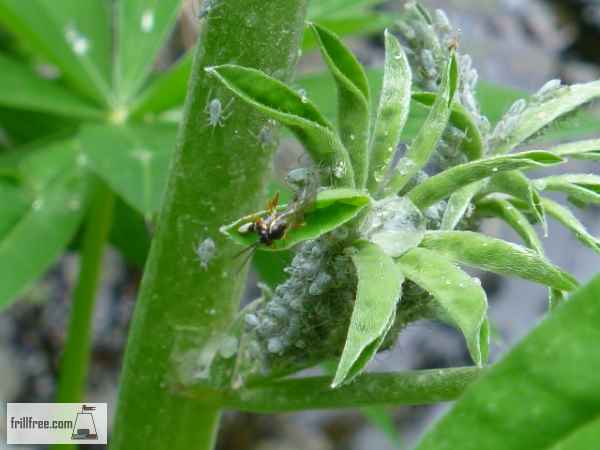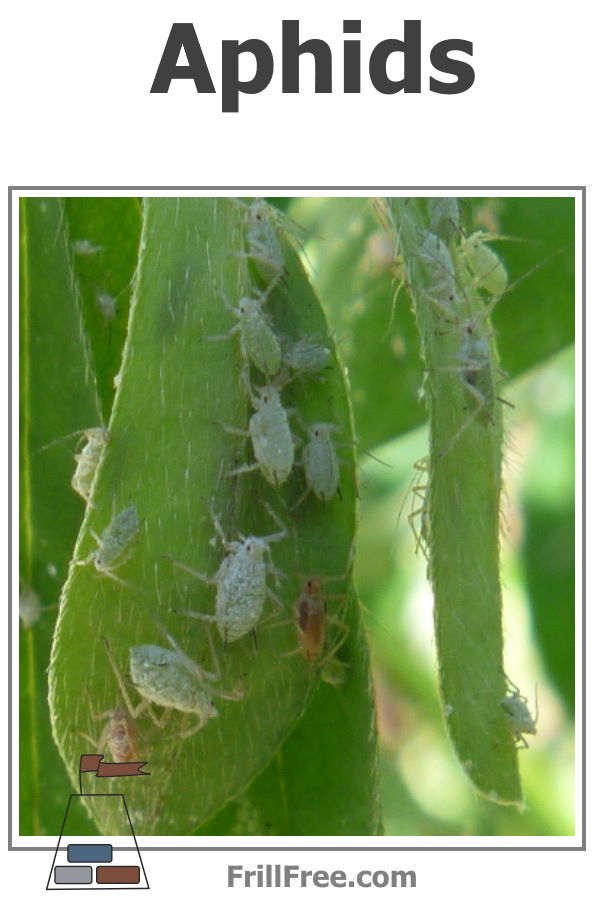Aphids
Also Known as 'Greenfly' and 'Plant Lice'
Aphids are sometimes also called 'plant lice' or 'greenfly' depending on where in the world you are gardening.
They spring, fully formed, ready to eat; no kidding.
Aphids are one amazing and interesting bug. They are pretty much all
female, and even as they are being formed, they already have more
microscopic insect babies inside them. They don't need a man; the live
young are all born female, in a really strange reproductive twist.
They are all wingless at first, but then triggered by an over population of them, the first winged ones are produced.
These
winged aphids can fly to the next plant over, continuing their havoc.
As they're the same color as their target plant, they can remain hidden
in plain sight for quite a while; it's only after the plant starts to
show stress that the gardener goes over for a look.
Imagine the horror when they realize that the whole plant is completely covered!
Other
giveaway hints that your plants have aphids is the presence of black
sooty mold, which grows on their 'honeydew' and also ants, who farm the
aphids for the same sweet nectar.
Wasps hovering around the plants will be predating the aphids, but they don't make much of a dent in the population. They will also farm them. Eliminate the aphids and the wasps and ants will go elsewhere.
A
couple of little soldiers that do take care of the problem are hover
flies (sometimes known as syrphid flies), lady bugs, lacewings and many
mites.
Encourage as many of these as possible to help in your
battle against aphids, which not only can drain a plants vigor, but they
are also a vector for viruses.
 Aphids, sucking the life out of Lupins
Aphids, sucking the life out of Lupins
Other ways to deal with them is
to spray the plant all over with a hard fine spray to wash them off.
They're fragile, and usually their mouthparts break off and so they can
no longer feed.
You can also dust the plant with diatomaceous
earth, a very fine powder with sharp edges; this cuts the skin of the
aphids, and they dry out.
Birds should be welcome in your garden too; they eat a lot of insects, including aphids, especially when feeding their young.
Rycke has this to add;
Aphids are manna from heaven for predatory insects. Speaking of little soldiers, don't forget soldier beetles. The live and eat soil pests 11 months under coarse mulch as larvae; come out soon after the first aphids; eat aphids; lay eggs in the mulch; and die.
Right now, I have aphids on my corn. Not to worry. I just saw a bunch of ladybugs mating and laying eggs on the infested plants. They should clean them up shortly.
Gardening naturally,
Rycke
So all is not lost in the fight against aphids eating your plants. They are a fleeting problem, with many benefits for predators, so if they're not troubling your crops, leave them for the birds and hungry insects.













